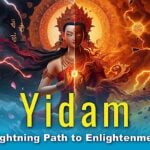PODCAST: Vajrakilaya’s Mantra beautifully chanted 108 times in Sanskrit — cutting the three poisons, overcoming your obstacles
Vajrakilaya and his mantra are important in our modern world — since Vajrakilaya is the activity of all the Buddhas. He is the wrathful Heruka emanation of glorious Buddha Vajrasattva. At the same time, he is the ultimate expression of Bodhichitta and compassion and love.
Listen or chant along with the Sanskrit version of his mantra — famous for accomplishing the Enlightened activities and overcoming our obstacles, chanted beautifully by Hrishikesh Sonar.
Om Vajra Kili Kilaya Sarva Vighnam Vam Hum Pey
CREDITS
Original music, singing and arrangement by Hrishikesh Sonar
The literal translation of the mantra
Although mantras can’t be broken down by word translation — ideally, listen to full commentaries from teachers on the deeper meanings — for helpful reference, we have translated the Sanskrit mantra somewhat literally here.
Om Vajra Kili Kilaya Sarva Vighnam Vam Hum Pey
Vajra
Vajra, in Sanskrit, has both the meanings of “thunderbolt” and “diamond.” Like the thunderbolt, the vajra cleaves through ignorance. It also connotes “swift” or “instant.”
Kili
Kila : in Sansrit कील; IAST: kīla for a three-sided peg, stake, or knife. Kili associated with Quick Activity, Quick Action, Strength — as in the small three-cornered tent peg that can secure a tent against the worse weather. But also “staking” quickly or pegging instantly.
Kilaya
VajraKilaya is the name of the great One, in this a form of Vajrakila (which means Thunderbolt quickly “Spike” or nail down — as in transfixing our obstructions to Enlightenment.
Sarva
Sarva (सर्व) Sanskrit — Sarva (सर्व) refers to “(the attainment of) everything”
Vighnam
Noun. विघ्न • (vighna) m. a breaker, destroyer. an obstacle, impediment, hindrance, opposition, prevention, interruption, any difficulty or trouble.
Vam
(Bam in Tibetan) Vam is the seed syllable of Vajrakilaya — although Hum is also considered his ultimate seed syllable (Dharmakaya seed syllable). Vam is the bija, or seed, sound of the sacral chakra. When chanting the mantra, vam, the power of the sound vibrations is believed to cleanse this chakra, which is the energy center of creativity
Hum
Hum connotes “method and wisdom” or “Compassion and comprehension of Shunyata”
Pey (Phet, Phat)
Note: this is a phonetic spelling: it is a slightly aspirated sound like P-Hey (with a soft “tuh” sound at the end) — hard to pronounce so most people, chant “pey!”)
Pey means “cutting through” or “cut!” — as in cutting all obstacles to success, siddhis and Enlightenment.
Typically, online you’ll find this mantra chanted in the Tibetan version
OM BENZA KILI KILIYA SARWA BIGHANEN BAM HUNG PHAT
More articles by this author
Search
Latest Features
Please support the "Spread the Dharma" mission as one of our heroic Dharma Supporting Members, or with a one-time donation.
Please Help Support the “Spread the Dharma” Mission!

Be a part of the noble mission as a supporting member or a patron, or a volunteer contributor of content.
The power of Dharma to help sentient beings, in part, lies in ensuring access to Buddha’s precious Dharma — the mission of Buddha Weekly. We can’t do it without you!
A non-profit association since 2007, Buddha Weekly published many feature articles, videos, and, podcasts. Please consider supporting the mission to preserve and “Spread the Dharma." Your support as either a patron or a supporting member helps defray the high costs of producing quality Dharma content. Thank you! Learn more here, or become one of our super karma heroes on Patreon.
Lee Kane
Author | Buddha Weekly
Lee Kane is the editor of Buddha Weekly, since 2007. His main focuses as a writer are mindfulness techniques, meditation, Dharma and Sutra commentaries, Buddhist practices, international perspectives and traditions, Vajrayana, Mahayana, Zen. He also covers various events.
Lee also contributes as a writer to various other online magazines and blogs.














